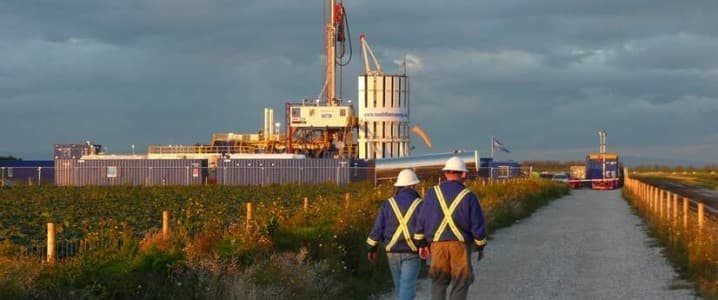UK’s onshore energy body has slammed Tory MP Chris Skidmore’s reported omission of fracking from its net zero review, raising concerns over the consistency of its approach to energy policy. UK Onshore Oil and Gas (UKOOG) criticised the decision as “premeditated” and “wholly unjustified.”

Charles McAllister, director of policy, told City A.M.: “It is impossible to conduct a fair review of the economic case for Net Zero without examining gas supply out to 2050, and it is therefore obvious that the development of the abundant shale gas resources in the North of England should be a material consideration.”
Last month, Tory MP Chris Skidmore was appointed by Business Secretary Jacob Rees-Mogg to lead a four-month review of the UK’s net zero target, and establish the best business and energy security case for historic cuts to carbon emissions over the next three decades.
The review will not look at fracking, Skidmore confirmed to The Times, as he did not consider fracking to be a“significant energy source” that helps the UK maintain security of supply.
It will instead focus on six elements, including energy security, talking with the wind, solar and nuclear industries, and hearing how small and medium businesses can afford to cut emissions.
He has warned investors that fracking will be a “non-starter” and that the practice was “not an opportunity for Britain” compared to emerging renewable technologies.
These comments appear at odds with the Government, which lifted the three-year moratorium in September as it scrambles to shore up domestic energy supplies.
Prime Minister Liz Truss has consistently talked up the prospect of fracking and its role in meeting the UK’s energy needs, and has vowed to “get gas flowing within six months.”
When lifting the fracking ban, Rees-Mogg argued the UK needed to “explore all avenues available” to boost energy security.
He said: “It’s right that we’ve lifted the pause to realise any potential sources of domestic gas.”
UKOOG pushes fracking’s energy potential
Fracking involves injecting a water, sand and chemicals at high pressure into boreholes deep underground to fracture rock and release shale gas.
UKOOG told City A.M. it could significantly reduce the UK’s reliance on “costly, insecure and carbon intensive natural gas imports,” with country meeting over half its gas needs from overseas imports of gas and liquefied natural gas (LNG) such as Norway, US and Qatar.
McAllister said: “The carbon intensity of UK shale gas production has been forecast to be one quarter of that of imported LNG and we must compete with 42 other nations to secure LNG supplies”
The group has previously cited data from the British Geological Survey (BGS) there could be as much as 37.6tn cubic metres of shale gas under the ground.
If ten per cent was recoverable, UKOOG argues this would be enough to help meet the country’s energy needs for the next five decades.
The policy director also argued that the “intentional exclusion” of shale gas from the review ignores the possibility to drive billions of pounds in community benefits and business rates into the North of England.
He concluded: “We would encourage Skidmore to give the UK onshore oil and gas industry, which has produced energy for this country for over a century, an equitable hearing”.
Fracking revival follows three year moratorium
A moratorium was first imposed on fracking in 2019 amid concerns over tremors, and the Conservative manifesto in December 2019 said the party would “not support fracking unless the science shows categorically it can be done safely”.
Earlier this year, the North Sea Transition Authority (NSTA) ordered Cuadrilla to plug the two remaining shale wells.
However, following the war in Ukraine, NSTA gave fracking a reprieve – pausing its plugging requirement – before the Government decided to commission BGS to conduct a scientific survey on the practice to assess whether the process could be made safer.
The Government then lifted the ban last month, with the scientific survey suggesting that while concerns over tremors remained, there was a case for exploration and drilling to determine the scale of opportunity and the viability of fracking.
Households will now be offered up to £1,000 to approve provisional fracking in their area under a plan backed by Government ministers to secure local consent, as first reported in The Telegraph.
Companies that want to drill for shale gas will now be going door-to-door to convince residents to green-light the move.
Exploratory drilling will then be allowed to go ahead if more than 50 per cent of households in the local vicinity give their approval for it.
Fracking remains unpopular compared to other energy activities, such as onshore wind and solar power, with YouGov polling from May suggesting the people oppose the revival of fracking by a 46-29 margin.
The Government’s most recent polling – conducted last autumn – found just 17 per cent of the public supported fracking, compared with 87 per cent who backed renewables.
UKOOG has pledged to work with the Government and local communities over potential shale gas extraction sites.
The Government and Skidmore have both been approached for comment.
